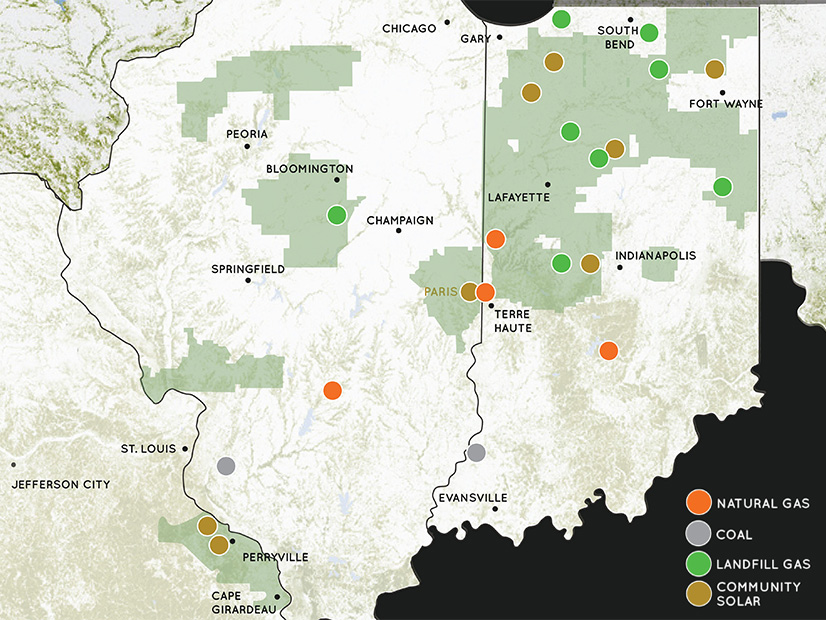FERC on Nov. 6 rejected new contracts the Wabash Valley Power Alliance had filed for its members and a distributed generation policy proposed by the generation and transmission cooperative (ER24-36).
The commission said the rejections were without prejudice and opened a show cause proceeding (EL24-16) to determine whether Wabash’s tariff is just and reasonable and not unduly preferential.
Indiana-based Wabash serves wholesale customers in both MISO and PJM, meaning it has to buy transmission and ancillary services from both RTOs. However, two of its members — Tipmont Rural Electric Membership Cooperative and Citizens Electric Corporation — alleged that Wabash failed to separate out those purchases in contracts with those customers, running afoul of FERC’s unbundling rules.
The new contracts, filed in 2023, should be subject to FERC Order 888 because its unbundling rules have been in effect for all contracts since July 1996, the complainants argued.
Wabash argued that, while Tipmont and Citizens are members of the alliance, the two co-ops declined to sign 2023 contracts and should not be allowed to participate in the FERC proceeding. The pair’s arguments are based on existing contracts and should not have an impact on FERC’s review of the 2023 deals, Wabash said.
FERC found that the contracts do not run afoul of the commission’s unbundling rules because they do not establish a bundled rate, but merely incorporate the rate established by the Wabash tariff, which is on file with the commission.
But the commission said it could not accept the contracts as written in part because they require member co-ops to provide 31 years of notice to avoid an automatic five-year extension.
“While we do not here decide whether it might ever be just and reasonable to include a provision requiring 31 years of notice to avoid an automatic five-year extension in a requirements agreement, it is incumbent on the applicant in an FPA section 205 proceeding, i.e., Wabash, to affirmatively demonstrate that such a provision is just and reasonable with regard to the agreement presented to the commission for its approval,” FERC said. “Wabash does not support this proposal other than to observe that the executing members desired the long-term stability of their contractual relationship with Wabash and that they signed the 2023 contracts.”
Wabash did not adequately show its proposal to be just and reasonable, instead focusing more on Tipmont’s arguments against it and claiming that the co-op failed to prove the 31-year notice requirement was unjust and unreasonable, the commission said.
Tipmont and Citizens also argued that several policies that should be included in the tariff are not. In any future filing, Wabash will have to include them or show that they do not affect rates and service significantly.
The two members also filed protests against “Buyout Policy D-2” in the contract, which determines the amount of money a member would owe Wabash when departing from the cooperative. Tipmont is pursuing exit from Wabash in a separate, ongoing proceeding, and Citizens complained that Wabash just applied the methodology from that case to all members even though it was only designed for Tipmont.
FERC also rejected Buyout Policy D-2, saying Wabash failed to make clear how it will use any methodology developed in Tipmont’s exit case and instead relied on unclear language saying it would take the case “into account” when dealing with future exits.
FERC additionally rejected Wabash’s Distributed Generation Policy, which determines how much of that type of resource its members can use. The commission found fault with Wabash’s proposal that it could waive that policy for any given member based on 75% approval of its board.
The rule “would give the board unfettered discretion when considering a member request to waive the terms of a policy that the commission had otherwise found just and reasonable,” FERC said.
While none of the contracts ran afoul of FERC’s unbundling rules, the commission said it could not say the same for the tariff, which will be the subject of the show cause proceeding. Unbundling is needed to implement non-discriminatory open access transmission, and it is unclear whether the tariff provides it, FERC said.
Wabash will have to come back to FERC within 60 days to either alter the rules in question or explain why they do not run afoul of unbundling requirements. Interested parties will be able to file comments 21 days later.
Wabash can revise its tariff to deal with the unbundling issues under Section 205 of the Federal Power Act, which would place the Section 206 show cause proceeding in abeyance, FERC said.




